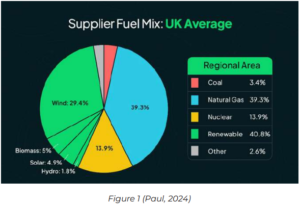Research Objectives:
Analyse the role of sustainable business practices in mitigating climate change. Investigate the connection between entrepreneurial leadership and the adoption of sustainable practices. Explore how digital tools and innovation can be leveraged to enhance the effectiveness of sustainable business practices. Offer actionable insights for businesses seeking to align their operations with sustainability goals.
Keywords:
Sustainable Business, Entrepreneurship, Leadership, Climate Change, Digital Integration
Bio
Nkechi Okorocha is a pioneering Nigerian businesswoman who has made history in the UK. She achieved groundbreaking milestones, becoming the first Nigerian businesswoman in the UK to be recognised by the Guinness Book of Records. She also became the first woman to receive the Commonwealth Business Consultant in the UK and Ireland, and Lifetime Achievement Award from BEEFTA.
Alongside her husband, Mr. Ike Okorocha, a Consultant Obstetrician and Gynaecologist, Nkechi ventured to the United Kingdom in 1993, seeking new opportunities and a better life for their family. Despite facing challenges as an immigrant and mother of three, Nkechi’s determination and resilience supported by her husband propelled her to extraordinary success.
She is not only an accomplished accountant but also an author, mindset coach, mentor, and leader of leaders. Her wide-ranging expertise and unwavering commitment to excellence have earned her recognition and accolades both nationally and internationally.
Abstract
The profound impact of business operations on climate change has become an undeniable reality in contemporary life. Businesses worldwide are trying to understand how to create a balance between economic pursuits and environmental responsibility.
Through a thorough review of literature, this research analyses the relationship between sustainable business practices, entrepreneurship, and leadership. It also explores the impact of visionary leadership in fostering a corporate culture prioritising environmental responsibility and long-term sustainability with the objective of mitigating climate change.
Findings reveal that businesses adopting entrepreneurial initiatives grounded in environmental responsibility, innovation, and ethical practices play a pivotal role in mitigating climate change. The integration of sustainable business practices using digital means, coupled with effective leadership and leveraging digital innovations, not only reduces carbon footprints but enhances corporate resilience and long-term profitability.
This research provides actionable insights for businesses aligning their operations with sustainable development goals, emphasizing the significance of leadership in fostering a culture of sustainability.
It underscores the need for businesses to embrace practices harmonizing economic prosperity with environmental stewardship for a more resilient and responsible global business ecosystem.
Introduction
The stark reality of climate change, primarily driven by human activities, poses an existential threat to the planet’s health and the future of humanity (Kraakman, 2022) (IPCC, 2024). Businesses, once viewed as bystanders, are now recognised as major contributors. Their production processes, energy consumption, and waste generation leave a significant carbon footprint (Roletto, et al., 2024). Consumers are no longer passive participants – they are wielding their purchasing power as a powerful tool, demanding transparency and a strong commitment to sustainability from the companies they support (Huangfu, Ruan, Zhao, Wang, & Zhou, 2022). This shift in consumer behaviour has created an urgent need for businesses to transform. Simply “doing business as usual” is no longer tenable. This academic study delves into the crucial juncture of sustainable business practices, entrepreneurship leadership, and mitigating climate change. It delves into the role of entrepreneurial leadership in nurturing a culture of environmental accountability within Entrepreneurial leaders, characterised by vision, innovation, and a risk-taking spirit (Fontana & Musa, 2017), are uniquely positioned to drive positive change. They can champion sustainability initiatives, spearhead employee awareness campaigns, and develop innovative solutions to environmental challenges.
However, a superficial commitment to sustainability is insufficient. Businesses must integrate environmental responsibility into their core values and operational practices. This can encompass a range of initiatives, such as adopting renewable energy sources, implementing resource efficiency measures, and transitioning to circular economy models (Kumar, Darshna, & Ranjan, 2023). These practices not only demonstrate a commitment to environmental stewardship but can also lead to significant reductions in carbon footprints. Studies show that businesses prioritizing sustainability outperform their less sustainable counterparts in the long term (Somani, 2021).
By examining the critical relationship between these factors, this research aims to shed light on how businesses, spearheaded by visionary and entrepreneurial leadership, can contribute to a more sustainable future. This exploration will not only positively impact the environment but also strengthen the competitive edge of businesses in a marketplace increasingly driven by consumer demands for environmental responsibility.
Objectives
This research paper on Sustainable Business, Entrepreneurship Leadership, and Mitigating Climate Change aims to achieve the following objectives:
- Analyse the role of sustainable business practices in mitigating climate change. This objective examines how businesses can reduce their environmental impact through practices like using renewable energy, reducing waste, and implementing resource efficiency measures. These objectives offer a thorough understanding of how the interplay between sustainable business practices, entrepreneurial leadership, and technological advancements can contribute to mitigating climate change.
- Investigate the connection between entrepreneurial leadership and the adoption of sustainable practices. This objective explores how entrepreneurial leaders, characterised by vision, innovation, and risk-taking, can champion sustainability within organisations and drive positive environmental change.
- Explore how digital tools and innovation can be leveraged to enhance the effectiveness of sustainable business practices. This objective examines how technologies like big data analytics and cloud computing can help businesses optimise resource use and reduce their environmental footprint.
- Offer actionable insights for businesses seeking to align their operations with sustainability goals. This objective will translate the research findings into practical recommendations that businesses can implement to become more environmentally responsible.
These objectives offer a thorough understanding of how the interplay between sustainable business practices, entrepreneurial leadership, and technological advancements can contribute to mitigating climate change.
2.0 Methodology
This research paper on Sustainable Business, Entrepreneurship Leadership, and Mitigating Climate Change employed a literature review methodology to explore the existing body of knowledge on the subject.
Data Sources:
Academic databases: Scholarly articles were retrieved from reputable academic databases such as ScienceDirect, Google Scholar, JSTOR and Scopus. These databases provide access to peer-reviewed research on a wide range of business and environmental topics
Publications: Articles from credible business publications like Forbes were used to capture current trends in consumer behaviour and business practices related to sustainability.
Search Strategy: Keywords: A combination of relevant keywords was used to identify relevant literature. Examples include “sustainable business practices,” “entrepreneurial leadership,” “climate change mitigation,” “green economy,” “circular economy,” and “environmental responsibility.”
Inclusion and Exclusion Criteria: Articles were primarily selected based on the following criteria:
Publication Date: The emphasis was on recent publications (from the past decade) to ensure the research aligns with current trends and developments.
Relevance: Articles were included if they directly addressed the research objectives and provided valuable insights into the relationship between sustainable business practices, entrepreneurship leadership, and mitigating climate change.
Peer-Review: Peer-reviewed academic articles were prioritised to ensure the quality and credibility of the research.
Source Credibility: Articles from reputable organisations and business publications were also included to supplement the academic research.
Data Analysis:
A thematic analysis methodology was utilised to examine the gathered literature. This involved identifying recurring themes and concepts across the various sources. The research then synthesised and interpreted themes to cultivate a thorough comprehension of the correlation between the research variables.
3.0 Results and Discussion
3.1 The Role of Sustainable Business Practices in Mitigating Climate Change
The research overwhelmingly confirms a strong correlation between sustainable business practices and mitigating climate change. Businesses are major contributors to environmental issues through their core operations. There is a significant impact that businesses have on the environment, primarily through production processes, energy consumption, and waste generation (Velenturf & Purnell, 2021). However, the research also offers a beacon of hope by implementing sustainable practices, businesses can greatly lessen their environmental impact and play a crucial role in mitigating climate change.
Renewable Energy:
Shifting from fossil fuels to renewable energy sources like solar, wind, and geothermal power offers a significant opportunity to reduce greenhouse gas emissions (Qusay, et al., 2024). These clean energy sources produce minimal to no emissions during operation, drastically reducing a company’s carbon footprint. Figure 1 illustrates that renewable energy sources accounted for 40.8% of the power supplied to the National Grid in 2023. To elaborate, wind energy comprised 29.4% of the total, while solar projects contributed 4.9% (Paul, 2024).
Figure description : Supplier fuel mix: UK average (for the year 1 April 2022 to 31 March 2023)

Resource Efficiency:
Implementing measures to conserve resources like water, raw materials, and energy isn’t just environmentally friendly; it can also lead to significant cost savings for businesses (Moshood, et al., 2022). Resource efficiency practices can encompass various strategies, such as optimizing production processes to minimize waste, implementing water-saving technologies, and using energy-efficient equipment. These practices not only reduce a company’s environmental impact but also improve their resource utilization and potentially lead to increased profitability.
Circular Economy:
Transitioning from the conventional linear “take make-dispose” economic model to a circular economy model offers a holistic approach to mitigating climate change. The circular economy prioritizes waste minimisation and resource depletion by designing products for disassembly, reuse, and recycling (Sönnichsen, de Jong, Clement, Maull, & Voss, 2024). This can involve practices like extending product lifespans through modular design, developing take-back programs for used products, and incorporating recycled materials into production processes. By closing the resource loop, the circular economy minimises environmental impact and promotes resource sustainability. Furthermore, sustainable business practices often have a ripple effect. By reducing their environmental footprint, businesses not only contribute directly to climate change mitigation but also inspire and encourage other stakeholders to adopt sustainable practices. This creates a positive domino effect, paving the way for a more sustainable future.
3.2. Entrepreneurial Leadership and Sustainable Practices
The research underscores the critical role of entrepreneurial leadership in fostering a culture of environmental responsibility within organisations. Entrepreneurial leaders, characterised by their visionary thinking, innovative spirit, and willingness to take calculated risks (Nagrecha, 2024), are uniquely positioned to drive positive environmental change. They act as catalysts, facilitating their organisations towards a more sustainable future through several key strategies:
Championing Sustainability Initiatives
Effective leaders set the tone from the top (Somani, Progressing Organisational Behaviour towards a New Normal, 2021). They actively promote sustainability within the organisation by integrating environmental responsibility into the company’s mission, vision, and core values. This commitment manifests in actions like advocating for green investments in renewable energy sources, resource-efficient technologies, and circular economy initiatives (Hariram, Mekha, Suganthan, & Sudhakar, 2023). By championing these initiatives, leaders not only demonstrate their own commitment but also inspire and empower employees to embrace sustainability.
Employee Awareness and Engagement:
A critical component of fostering a culture of sustainability is ensuring employee buy-in (Ketprapakorn & Kantabutra, 2022). Entrepreneurial leaders can spearhead comprehensive employee awareness campaigns to educate employees on the environmental impact of the company’s operations and the importance of sustainable practices (PBCom, 2022). This can encompass workshops, training programs, and internal communication initiatives that highlight the company’s sustainability goals and empower employees to contribute. Additionally, leaders can create opportunities for employee engagement through initiatives like volunteer programs focused on environmental restoration or internal competitions that incentivise sustainable practices in daily operations.
Developing Innovative Solutions:
Entrepreneurial leaders thrive in environments that encourage innovation (Ercantan, Eyupoglu, & Ercantan, 2024). They can foster a culture of creative problem-solving within their organisations, specifically targeting environmental challenges. This can involve encouraging employees to brainstorm and develop new technologies, products, or business models that address environmental concerns. Additionally, leaders can champion research and development initiatives focused on finding sustainable solutions to industry-specific environmental problems. By fostering a culture of innovation, entrepreneurial leaders empower their teams to become active participants in the fight against climate change. Furthermore, effective entrepreneurial leaders understand the importance of leading by example (Malibari & Bajaba, 2022). They integrate sustainable practices into their own work styles and decision-making processes. This can involve setting ambitious environmental goals for the organisation, adopting eco-friendly practices within their departments, and demonstrating a personal commitment to sustainability. By leading by example, entrepreneurial leaders inspire others to follow suit and help build a more sustainable future.
3.3. Digital Tools and Sustainable Business Practices
The research highlights the crucial role of digital tools and innovation in amplifying the effectiveness of sustainable business practices. These tools act as an extension of a company’s sustainability efforts, providing valuable data, optimising processes, and driving real-world environmental improvements. Some key digital weapons in the fight against climate change:
Big Data Analytics:
In today’s data-focused world, big data analytics has risen as a game-changer for sustainable businesses (Masenya, 2023). Businesses can leverage this technology to collect and analyse large volumes of data pertaining to their operations, including energy consumption, resource use, and waste generation. By analysing with this data, companies can pinpoint areas for enhancement and utilise data-driven insights to streamline their processes. For example, businesses can use analytics to pinpoint inefficiencies in their supply chains, identify opportunities for reducing material waste, or track their progress towards renewable energy goals. This data driven approach allows businesses to target their sustainability efforts strategically and maximise their environmental impact.
Cloud Computing:
Cloud computing offers a sustainable advantage by enabling businesses to reduce their reliance on physical infrastructure (Yenugula, Sahoo, & Gowswami, 2024). Traditional on-premises data centres require significant energy for cooling and powering servers. By migrating to the cloud, businesses can leverage the efficiency of large-scale data centres operated by cloud providers, who are increasingly investing in renewable energy sources to power their operations. Furthermore, cloud computing facilitates increased flexibility and scalability, empowering businesses to adjust their resource usage based on real-time needs, further minimising their environmental footprint.
Internet of Things (IoT):
The Internet of Things (IoT) is revolutionising the way businesses collect and utilise environmental data (Langley, et al., 2021). IoT sensors can be embedded in equipment, buildings, and even throughout supply chains, allowing for realtime monitoring of energy use, resource consumption, and environmental conditions. This real-time data provides invaluable insights for businesses to identify inefficiencies and make immediate adjustments. For example, a manufacturing plant can use IoT sensors to monitor energy usage on individual machines, allowing them to identify and address energy-consuming equipment. Similarly, smart agriculture techniques can leverage IoT sensors to optimise water usage and fertiliser application, minimising environmental impact.
Beyond these core tools, the digital landscape offers a plethora of other innovative solutions. Artificial intelligence (AI) can be used to automate tasks and optimise resource use, while blockchain technology can improve supply chain transparency and promote sustainable sourcing practices (Tsolakis, Schumacher, & Dora, 2023). By embracing these digital tools and fostering a culture of innovation, businesses can unlock a new level of environmental responsibility and make a substantial contribution to fostering a more sustainable future.
Sustainable business practices offer a viable path towards mitigating climate change. Businesses that prioritise sustainability not only enhance environmental sustainability but also attain a competitive advantage in a marketplace increasingly driven by consumer demands for environmental responsibility. However, challenges remain. Implementing sustainable practices can require significant upfront investments (Zenghelis, Serin, Stern, & Valero, 2024). Businesses may also face resistance from traditional mindsets within the organisation. Additionally, the effectiveness of these practices relies heavily on strong leadership commitment and employee buy-in.
4.0 Conclusion
The overwhelming scientific consensus indicates a negative impact on climate change, driven by human activities, posing a dire threat to our planet’s health and humanity’s future. Businesses, once viewed as bystanders, are now recognised as major contributors through their environmental footprint. Consumers are demanding transparency and a strong commitment to sustainability, forcing businesses to re-evaluate their operations (Reichheld, Peto, & Ritthaler, 2023). This research delved into the critical intersection between sustainable business practices, entrepreneurial leadership, and mitigating climate change. The findings highlight the crucial role of sustainable practices like renewable energy, resource efficiency, and circular economy models in reducing a business’s environmental impact. Furthermore, the research emphasises the importance of entrepreneurial leadership in driving positive change. Entrepreneurial leaders, characterised by vision and risk-taking, can champion sustainability initiatives, raise employee awareness, and foster innovation for environmental solutions. Additionally, digital tools like big data analytics, cloud computing, and the Internet of Things offer valuable resources for optimising resource use and improving environmental performance.
In conclusion, this research underscores the critical role businesses can play in mitigating climate change. By embracing sustainable practices and leveraging entrepreneurial leadership and digital tools, businesses can transition towards a more sustainable future. This not only benefits the environment but also strengthens their competitive edge in a marketplace increasingly driven by consumer demands for environmental responsibility.
Recommendations
Drawing from the conclusions of this research, the subsequent recommendations are proposed:
Businesses should conduct a sustainability audit to identify areas for improvement in their operations. Entrepreneurial leaders should champion sustainability within their organisations and develop a clear vision for a sustainable Businesses should invest in digital technologies like big data analytics and cloud computing to optimise resource usage and reduce environmental impact.
Collaboration with stakeholders, such as suppliers and customers, is crucial to promote sustainable practices throughout the supply chain.
Businesses should prioritise transparency in their sustainability efforts, communicating their initiatives and progress to stakeholders.
Governments can incentivise sustainable business practices through tax breaks, subsidies, and favourable regulations.
Educational institutions can play a vital role by equipping future business leaders with the knowledge and skills necessary to integrate sustainability into their business models. Further research exploring successful case studies and specific digital tool applications within sustainable business models can provide even more valuable insights for businesses seeking to adopt a more environmentally responsible approach.
References
Ercantan, K., Eyupoglu, Ş., & Ercantan, Ö. (2024). The Entrepreneurial Leadership, Innovative Behaviour, and Competitive Advantage Relationship in Manufacturing Companies: A Key to Manufactural Development and Sustainable Business. Sustainability.
Fontana, A., & Musa, S. (2017). The impact of entrepreneurial leadership on innovation management and its measurement validation. International Journal of Innovation Science.
Hariram, N., Mekha, K., Suganthan, V., & Sudhakar, K. (2023). Sustainalism: An Integrated SocioEconomic-Environmental Model to Address Sustainable Development and Sustainability. Sustainability.
Huangfu, Z., Ruan, Y., Zhao, J., Wang, Q., & Zhou, L. (2022). Accessing the Influence of Community Experience on Brand Loyalty Toward Virtual B ra n d C o m m u n i t y : Developing Countr y Perspective. Front Psychol.
IPCC. (2024). Climate change: a threat to human wellbeing and health of the planet. Taking action now can secure our future. Geneva: The Intergovernmental Panel on Climate Change.
IRENA. (2017). RENEWABLE ENERGY: A KEY CLIMATE SOLUTION. International Renewable Energy Agency.
Ketprapakorn, N., & Kantabutra, S. (2022). Toward an organizational theory of sustainability culture. Sustainable Production and Consumption.
Kraakman, J. T. (2022). Gas Crossover in Alkaline Water Electrolysis. Eindhoven: Eindhoven University of Technology.
Kumar, S., Darshna, A., & Ranjan, D. (2023). A review of literature on the integration of green energy and circular economy. Heliyon.
Langley, D. J., Doorn, J. V., Ng, I. C., Stieglitz, S., Lazovik, A., & Boonstra, A. (2021). The Internet of Everything: Smart things and their impact on business models. Journal of Business Research, 853-863.
Malibari, M. A., & Bajaba, S. (2022). Entrepreneurial leadership and employees’ innovative behavior: A sequential mediation analysis of innovation climate and employees’ intellectual agility. Journal of Innovation & Knowledge
Masenya, T. M. (2023). Big Data Analytics as a Game Changer for Business Model Innovation in Small and Medium-Sized Enterprises in South Africa. International Journal of Innovation in the Digital Economy (IJIDE), 1-17.
Moshood, T. D., Nawanir, G., Mahmud, F., Mohamad, F., Ahmad, M. H., & AbdulGhani, A. (2022). Sustainability of biodegradable plastics: New problem or solution to solve the global plastic pollution? Current Research in Green and Sustainable Chemistry.
Nagrecha , J . (2024). Becoming An Entrepreneurial Leader In A World Striving For Consistency. Forbes.
Paul. (2024, 03 01). Renewable energy policy: solar and wind statistics (2024). Retrieved from Searchland: https:// searchland.co.uk/blog/ renewable-energy-policy-what-now
PBCom. (2022, 06 24). PBCOM EMPLOYEES C A S T E D T H E I R #VoteForEarth. Retrieved from PBcom: https:// www.pbcom.com. ph/media-center/pbcom-employees-casted-their-voteforearth#url
Qusay, H., Viktor, P., Al-Musawi, T. J., Ali, B. M., Algburi, S., Alzoubi, H. M., . . . Jaszczur, M. (2024). The renewable energy role in the global energy Transformations. Renewable Energy Focus.
Reichheld, A., Peto, J., & Ritthaler, C. (2023). Research: Consumers’ Sustainability Demands Are Rising. Harvard Business Review.
Roletto, A., Zanardo, M., Bonfitto, G., Catania, D., Sardanelli, F., & Zanoni, S. (2024). The environmental impact of energy consumption and carbon emissions in radiology departments: a systematic review. European Radiology Experimental.
Somani, P. (2021). IMPACT OF CLIMATE CHANGE AND COVID-19 ON HEALTH. Journal of Hunan University (Natural Sciences), 184-193.
Somani, P. (2021). Progressing Organisational Behaviour towards a New Normal. Journal of Economics, Finance and Management Studies, 1628-1633.
Sönnichsen, S., de Jong, A., Clement, J., Maull, R., & Voss, C. (2024). The Circular Economy: A Transformative Service Perspective. Journal of Service Research.
Tsolakis, N., Schumacher, R., & Dora, M. e. (2023). Artificial intelligence and blockchain implementation in supply chains: a pathway to sustainability and data monetisation? Ann Oper Res, 157–210.
Tsolakis, N., Schumacher, R., & Dora, M. e. (2023). Artificial intelligence and blockchain implementation in supply chains: a pathway to sustainability and data monetisation? Ann Oper Res, 157–210.
Yenugula, M., Sahoo, S. K., & Gowswami, S. (2024). Cloud computing for sustainable development: An analysis of environmental, economic and social benefits. Journal of Future Sustainability, 45-60.
Zenghelis, D., Serin, E., Stern, N., & Valero, A. (2024). Boosting growth and productivity in the United Kingdom through investments in the sustainable economy. Grantham Foundation.



